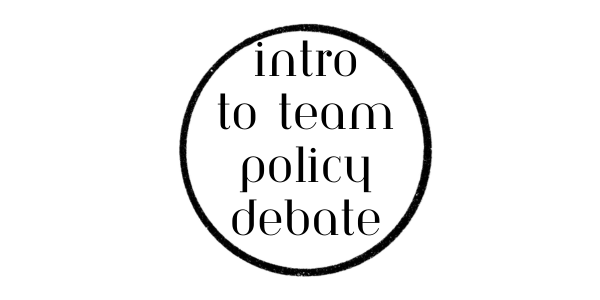
Unleashing the Power of Persuasion: Decoding High School and Middle School Team Policy Debate

Team Policy Debate
Dive into the world of Team Policy Debate, where middle and high school students engage in structured arguments for and against a resolution. Discover how they develop critical thinking, research skills, and persuasive abilities to craft compelling cases and engage in intense verbal battles.
- Discover the exciting realm of Team Policy Debate, where students engage in structured arguments on a resolution.
- Explore the process of selecting a resolution and understand how students develop persuasive cases to advocate for and against it.
- Learn how debaters conduct in-depth research, analyze evidence, and use logical reasoning to construct compelling arguments.
- Uncover the strategies and techniques debaters employ to communicate effectively, engage in rebuttals, and counter opposing arguments.
- Experience the thrill and intensity of high-stakes debating as students showcase their analytical prowess and eloquence on the debate stage.
Team Policy Debate
Team Policy Debate is a popular format in middle and high schools that challenges students to engage in intense verbal battles centered around a resolution. This debate-style requires teams of two students to argue for or against the given resolution. Through thorough research, critical analysis, and persuasive speaking skills, participants present cases and counterarguments, testing their ability to think critically, communicate effectively, and defend their positions.
The Resolution
Each academic year, a resolution is selected to be the primary focus of the Team Policy Debate. The resolution is the central topic that students will argue for or against using evidence and logical reasoning. Resolutions typically cover important socio-political issues, such as healthcare reform, foreign policy, or educational policies. The resolution is carefully crafted to encourage critical examination and foster thoughtful dialogue among participants.
Preparing for Team Policy Debate
When preparing for a Team Policy Debate, students invest significant time and effort into researching the resolution. This involves gathering relevant evidence, statistics, and expert opinions to support their arguments. Through extensive reading, online research, and interviews, they aim to build a strong foundation of knowledge that backs their stance. Thorough research is vital to construct compelling and well-informed arguments.
Build Affirmative and Negative Arguments
Armed with their research, debaters form their cases consisting of affirmative and negative arguments. The affirmative team supports the resolution, providing reasons and evidence to advocate for its implementation. On the other hand, the negative team aims to refute the affirmative's arguments, presenting counterarguments and evidence against the resolution. Each team composes their cases meticulously, ensuring coherence, logical flow, and persuasive appeals to engage the judges and audience.
Team Policy Debate Structure
Team Policy Debate follows a specific structure, allowing students to make strategic moves during the argumentation process. The debate is divided into various speeches, including constructive speeches, cross-examinations, and rebuttals. Constructive speeches establish the initial arguments, while cross-examinations allow teams to question and challenge their opponent's points. Rebuttals provide an opportunity to counter opposing arguments and summarize their own case convincingly.
Debate Techniques and Strategies
During the debate, students employ various techniques and strategies to communicate their ideas effectively. They utilize rhetorical devices, such as ethos, pathos, and logos, to appeal to the emotions, logic, and ethics of the audience. Additionally, they use evidence-based reasoning, logical fallacy identification, and persuasive language to strengthen their arguments and weaken those of their opponents.
Intense Discussions
The core of Team Policy Debate lies in the intense clash of ideas between the affirmative and negative teams. Each team presents well-structured arguments, heavily supported by evidence and logical reasoning while anticipating and countering the opposing team's strategies. The debaters engage in a verbal joust, skillfully dismantling their opponent's arguments while defending their own stance. This dynamic and intellectually stimulating environment encourages critical thinking and cultivates excellent analytical skills.
Refine Speaking and Debate Skills
Team Policy Debate provides students with a platform to refine their public speaking and debate skills. They develop the ability to think quickly on their feet, articulate their thoughts clearly, and respond effectively to challenges from their opponents. The format promotes teamwork, as each participant must coordinate their arguments and strategies with their partner to present a unified case. This collaborative approach nurtures valuable skills such as effective communication, adaptability, and cooperation.
Judges' Evaluations
The success of Team Policy Debate heavily relies on the judges' evaluation, who assess the student's ability to construct coherent arguments, support them with evidence, and effectively rebut their opponents. Judges evaluate the clarity of arguments, persuasiveness, respect for opponents' views, and overall presentation skills. This feedback from experienced judges helps students refine their debating abilities and identify areas for improvement.
Prepare for Future Academic and Professional Careers
Participating in Team Policy Debate not only nurtures critical thinking and persuasive skills but also prepares students for future academic and professional pursuits. The ability to analyze complex topics, construct compelling arguments, and effectively communicate ideas is a strong foundation for success in college and beyond. Competing in debate tournaments and achieving success can also enhance college applications, demonstrating students' dedication to intellectual growth and excellence.
Persuasive Communications and Critical Thinking
Team Policy Debate is an exhilarating avenue for middle and high school students to unlock their potential as persuasive communicators and critical thinkers. Encouraging students to engage in structured arguments, research, and analysis helps shape their perspectives, equips them with invaluable life skills, and prepares them to become articulate and influential individuals in their future endeavors. Whether they choose careers in law, politics, business, or any other field, the skills honed through Team Policy Debate will undoubtedly propel them toward success.
